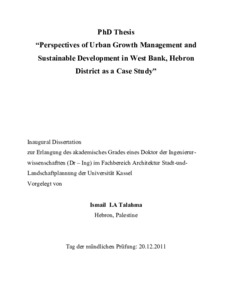| dcterms.abstract | The main objective of this PhD research study is to provide a perspective on the urban growth management and sustainable development in Palestine, and more specifically in Hebron district as a case study. Hebron is located 36 km south of Jerusalem, with an overall population size of around 600,000 people living in a total area around1246km2. Hebron is the biggest Palestinian district that has 16 municipalities and 154 localities. The research discusses and analyzes the urban planning system, economical and environmental policies and the solution required to manage and integrate the development elements to develop a sustainable development plan for Hebron. The research provides answers for fundamental questions such as what kind and definition of sustainable development are applicable to the Palestinian case?. What are the sustainability problems there and how the Israeli occupation and unstable political condition affect the sustainable development in Palestine? What are the urban growth management and sustainability policies and actions required from government, public and privets sector in Palestine?
The fast urban growth in Palestine is facing many problems and challenges due to the increase in the population size and the resulting impact of this increase including, but not limited to, the demand of new houses, need for more infrastructure services, demands on new industrial, commercial, educational and health projects, which in turn reduces the area of agricultural lands and threatens the natural resources and environment. There are also other associated sustainability problems like the absence of effective plans or regulations that control urban expansion, the absence of sufficient sustainable development plans at the national levels for the district, new job requirements, Israeli restrictions and occupation for more than 60 years, existence of construction factories near residential areas, poor public awareness and poor governmental funds for service projects and development plans.
The study consists of nine chapters. Chapter One includes an introduction, study objectives, problems and justifications, while Chapter Two has a theoretical background on sustainability topic and definitions of sustainability. The Palestinian urban planning laws and local government systems are discussed in Chapter Three and the methodology of research is detailed in Chapter Four. As for Chapter Five, it provides a general background on Hebron District including demographical and economical profiles, along with recommendations related to sustainable development for each profile Chapter Six addresses the urban environment, sustainability priorities and policies required. Chapter Seven discusses and analyzes infrastructure services including transportation, water and wastewater. As for Chapter Eight, it addresses the land use, housing and urban expansion beside the cultural heritage, natural heritage with relevant sustainable development polices and recommendations. Finally, Chapter Nine includes a conclusion and comprehensive recommendations integrating all of urban and sustainability event in one map.
Hebron has a deep history including a rich cultural heritage aged by thousands of years, with 47% of Hebron district population under 14 years old. Being the biggest Palestinian district, Hebron has thousands of industrial and economical organizations beside a large agricultural sector at Palestine level. This gives Hebron a potential to play major roles in developing a national sustainability plan, as the current urban planning system in Palestine needs urgent reform and development to fulfill the sustainability requirement. The municipalities and ministers should find permanent financial aid for urban planning and development studies so as to face future challenges. The Palestinian government can benefit from available local human resources in development projects; hence Palestinian people have sufficient qualifications in most sectors. The Palestinian people also can invest in the privet sector in Palestine in case businessmen have been encouraged and clear investment laws and plans have been developed.
The study provides recommendations associated to the sustainable development in Palestine in general and Hebron, as a case study, in specific. Recommendations include increasing the privet sector as well as the public involvement in urban growth management, and stopping unplanned urban expansion, subjecting granting building permits of new projects to the no-harm environmental impact assessment, increasing the coordination and cooperation between localities and central bodies, protection and renovation of old cites and green areas, increasing the quality and quantity of infrastructure services, establishing district urban planning department to coordinate and organize urban planning and sustainable development activities. Also, among recommendations come dividing Hebron into three planning and administrative areas (north, central and south), and dividing the sustainable development and implementation period (2010 to 2025) into three main phases. Finally, the study strongly recommends benefiting from the same urban development plans in similar districts at national and international levels, also to use new technologies and information systems in urban planning process. | eng |
| dc.contributor.corporatename | Kassel, Universität, FB 06, Architektur, Stadtplanung, Landschaftsplanung | |

